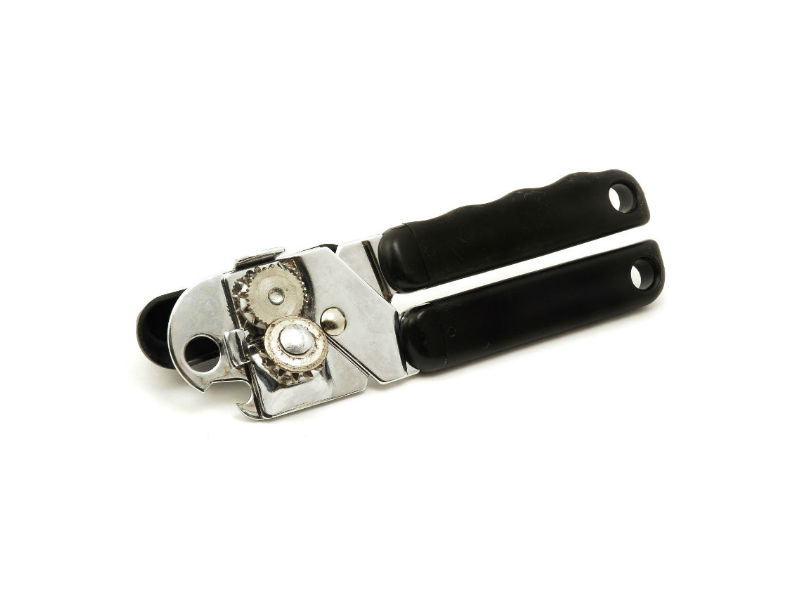Can openers rust for a few different reasons. First, the metal can opener is exposed to air and moisture which causes oxidation that leads to rust. Second, when cans are opened with a can opener, small bits of food or other liquids may get trapped in crevices and cause corrosion over time.
Third, the friction between the blade and the lid of the can cause tiny particles to be created which then form rust on the surface of the can opener. Finally, some openers come with plastic parts that may not be as resistant to water damage as metal ones; this could also lead to rust formation more quickly than usual. To prevent your can opener from getting rusty you should always clean it after each use and store it in a dry place away from direct sunlight.
Can openers be one of those kitchen tools that we use almost daily, yet rarely give much thought to? Unfortunately, can openers be prone to rusting due to their frequent contact with water and food particles? Rust on a can opener is not only unsightly but it can also cause the tool to break down quicker as well as contaminate your food with unsafe flakes of metal.
To avoid this problem, be sure to clean and dry your can opener after each use and store it in a dry area away from moisture.
How Do You Keep Can Openers from Rusting?
The best way to keep your can opener from rusting is by making sure you clean it thoroughly after every use. Make sure all the food residue and oil are removed from the blade, gears, and handle of the opener. After cleaning, dry the opener completely with a paper towel or lint-free cloth before storing it away.
Additionally, if possible store your can openers in cool and dry places away from moisture. If you do not have access to this kind of storage then consider investing in a plastic bag or container for them. Finally, make sure you regularly inspect your can openers for any signs of rusting such as discoloration or corrosion on metal parts so that you can take action quickly if needed!
How Long Can Openers Last?
Can openers be a kitchen staple and an essential tool for any home cook? While the average can opener will last for several years, how long it lasts is ultimately dependent on how much use it gets and how well it’s taken care of. Generally, you can expect your manual or electric can opener to last anywhere from three to five years before needing replacement.
If you take proper care of your can opener by cleaning and lubricating it regularly, then its lifespan could be extended even further. Additionally, opting for higher-end models that feature better build quality may also result in improved longevity since they’re usually made with sturdier materials than their cheaper counterparts. It’s important to inspect your can opener every few months to make sure there aren’t any loose parts or rust spots forming on its blades as these issues could cause the device to fail prematurely.
Overall, if treated with proper care over time, a good quality manual or electric can opener should provide many years of reliable service in the kitchen when needed most!
Can Rusty Can Openers Cause Tetanus?
Rusty can openers can potentially cause tetanus if not disposed of, or handled properly. While it is unlikely that a rusty can opener alone could lead to tetanus, the bacteria which cause this serious disease are widely found in soil and many other surfaces. The bacterium known as Clostridium tetani lives in these environments, and when an object with rusty edges comes into contact with a cut or wound, it can introduce the bacteria directly into your bloodstream.
In addition to cuts from a rusty can opener, other common ways for one to contract tetanus include stepping on something sharp like a nail or having another type of wound become contaminated by dirt containing C. tetani spores. To avoid contracting this infection from using a rusty can opener, make sure you wear gloves while handling it and clean any wounds promptly after coming into contact with rust particles before they have time to enter your body through an opening such as cuts or scrapes.
Will Stainless Steel Can Opener Rust?
Stainless steel can openers are a must-have tool in any kitchen. They are known for their durability and convenience, but one of the most common questions that people ask is whether or not stainless steel can openers will rust. The answer to this question is no!
Stainless steel is an alloy made up of iron and chromium which makes it resistant to corrosion, even when exposed to moisture. Because stainless steel does not corrode easily, a stainless steel can opener should last you many years without ever rusting. With proper care and maintenance such as drying off after each use and keeping away from strong detergents or cleaning agents, your stainless steel can opener should remain looking brand new for years.

Credit: magicarustremover.com
Rust on Can Opener Dangerous
Rust on a can opener is dangerous because the metal flakes of rust can get into your food. This could lead to serious health consequences if ingested, such as gastrointestinal problems and infections. It is important to inspect your can opener regularly for any signs of rust buildup, and replace it if necessary so that you don’t risk getting sick from eating contaminated food.
How to Clean a Rusty Can Opener
Cleaning a rusty can opener may seem daunting, but it doesn’t have to be complicated. To get started, fill a bowl with warm water and add some dish soap. Submerge the can opener in the soapy mixture for 10 minutes or so and then use an old toothbrush to scrub off any remaining rust spots.
If that isn’t enough, you may need to try using baking soda or white vinegar mixed with water as a paste on particularly stubborn areas of rust. Once all traces of rust are gone, rinse your can opener thoroughly with clean water and dry it off before storing it away!
Rust Proof Can Opener
A rust-proof can opener is an essential tool for any kitchen. It allows you to open cans quickly and safely, without having to worry about damaging the metal or leaving behind rusty residue. Rust-proof models are made of stainless steel or other corrosion-resistant materials that won’t corrode over time.
They also offer a longer lifespan than regular can openers, making them an economical choice in the long run.
How to Prevent Rust on Can Opener
To prevent rust on a can opener, it is important to clean and dry it after each use. If the can opener becomes wet or damp, immediately wipe it down with a dry cloth. Additionally, store the can opener in a cool and dry place when not in use to avoid any moisture that could cause rusting.
Finally, apply an oil-based lubricant such as WD-40 directly onto the blade of your can opener once every few months to protect against corrosion and help keep it working smoothly.
Swing-A-Way Can Opener
The Swing-A-Way Can Opener is one of the most popular and widely used can openers on the market. This manual can opener produces a smooth edge to cans, making it easier to open them without cutting yourself or spilling the contents. It’s durable construction makes it ideal for frequent use in both home and commercial settings.
Plus, its ergonomic design allows for comfortable handling and easy operation. With these features combined, it’s no wonder why this can opener has been trusted by households all over the world for decades!
How to Lubricate a Can Opener
Maintaining your can opener is important to keep it in good working condition. To lubricate a can opener, first make sure that the device is unplugged and cooled down if necessary. Use an oil-based lubricant such as WD-40 or vegetable oil and apply several drops of the fluid onto any moving parts such as gears, bearings, or joints.
Finally, turn on the can opener and move it around multiple times to allow the lubricant to spread evenly throughout all of its components.
How to Clean a Can Opener
Keeping your can opener clean is important for food safety and to ensure that it functions properly. To do so, put the can opener in a sink filled with warm water and mild soap. Use a sponge or soft cloth to scrub away any food residue or dirt on the blade and other parts of the can opener.
Rinse off the soap with cold water before reassembling all of the pieces back together. Then dry thoroughly with a paper towel before using it again!
Why Can Openers Stop Working
Can openers stop working for a variety of reasons? The most common issue is dull blades, which no longer cut the metal cans properly and cause the opener to slip or get stuck. Other problems can include broken gears, worn-out springs, and faulty handles that no longer turn easily.
Fortunately, most of these issues are easy to fix with some basic cleaning and maintenance; if not, it may be time to invest in a new can opener!
Conclusion
Overall, it is clear that can openers are subject to rust due to their metal components and exposure to moisture in the air. It is important for people to take steps such as drying them off after use or storing them away from humidity when not in use in order to minimize rusting and extend the life of their can opener. Additionally, preventive maintenance measures such as oiling may also be necessary depending on how frequently they are used.
With proper care and attention, can openers can last a long time without succumbing to rust.

